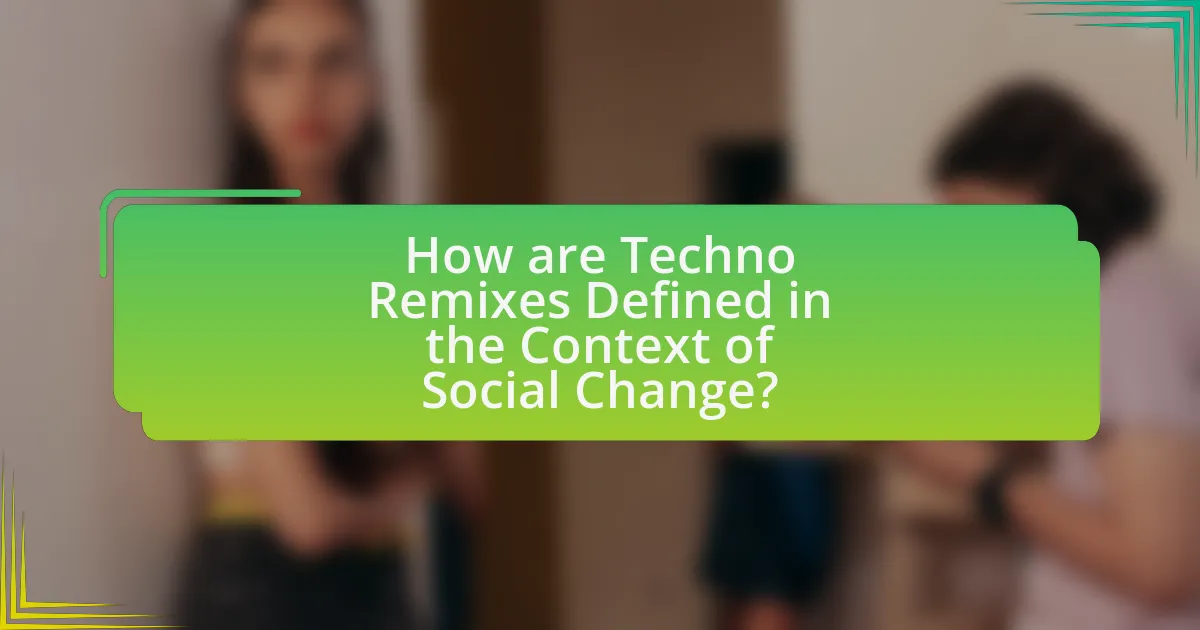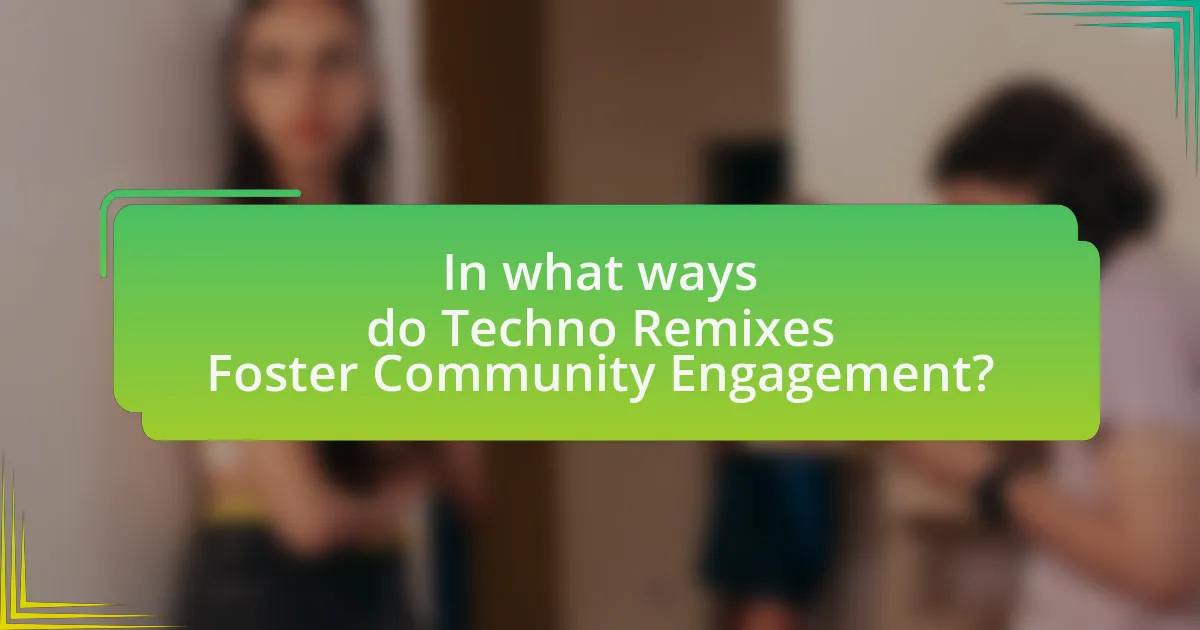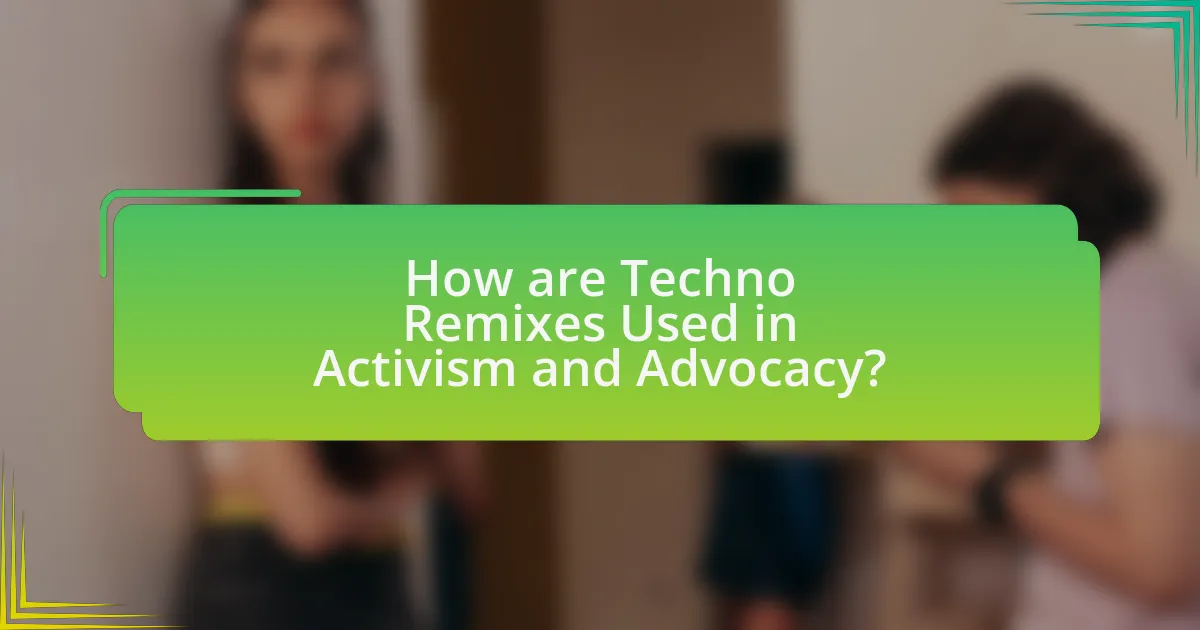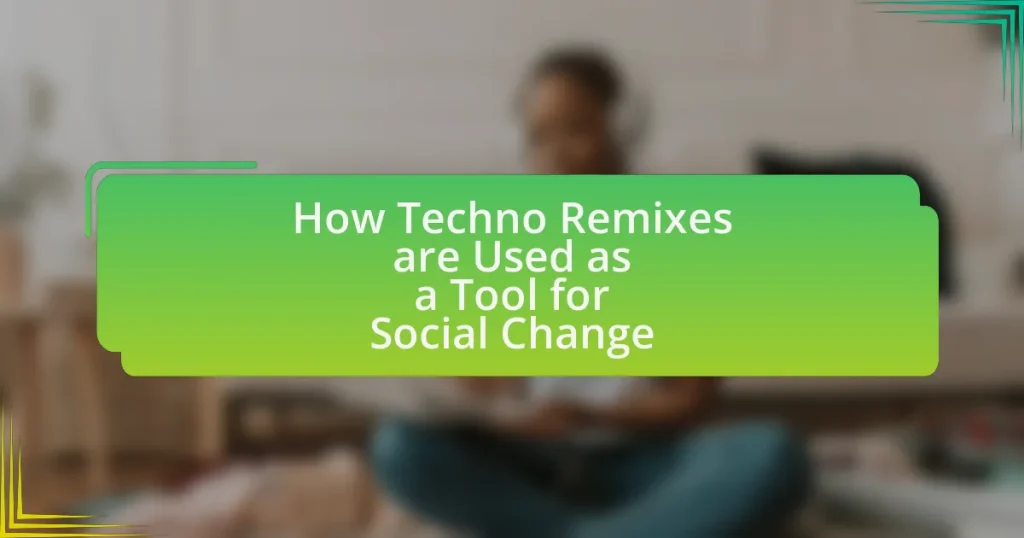Techno remixes are transformative musical adaptations that reflect and influence societal movements and cultural shifts, serving as a medium for expressing dissent, solidarity, and identity. The article explores the characteristics that distinguish techno remixes from other genres, the role of DJs and producers in their creation, and how these remixes serve as social commentary by incorporating samples and lyrics that address pressing social issues. It also examines the historical events that have shaped the themes in techno remixes, the ways they foster community engagement, and their impact on activism and advocacy. Additionally, the article discusses the implications of remix culture in the digital age and provides insights into how individuals can use techno remixes for personal expression and social change.

How are Techno Remixes Defined in the Context of Social Change?
Techno remixes are defined in the context of social change as transformative musical adaptations that reflect and influence societal movements and cultural shifts. These remixes often incorporate elements from various genres and cultures, serving as a medium for expressing dissent, solidarity, and identity. For instance, during the 1990s rave culture, techno remixes became synonymous with anti-establishment sentiments, promoting messages of freedom and community in response to political repression. This connection between music and social movements is supported by studies showing that techno music fosters collective experiences, which can mobilize individuals toward social activism.
What characteristics distinguish techno remixes from other music genres?
Techno remixes are distinguished from other music genres primarily by their repetitive beats, synthesized sounds, and emphasis on rhythm over melody. This genre typically features a tempo ranging from 120 to 150 beats per minute, creating a driving energy that is conducive to dance. Additionally, techno remixes often incorporate elements such as minimalism, layering of sounds, and the use of technology in production, which sets them apart from genres that prioritize vocal performance or traditional instrumentation. The use of samples and loops is prevalent, allowing for a continuous flow that enhances the immersive experience. These characteristics contribute to the unique atmosphere of techno remixes, making them a powerful medium for social change by fostering communal experiences in dance settings.
How do the elements of techno music contribute to its remix culture?
The elements of techno music significantly contribute to its remix culture by providing a structured yet flexible framework for creativity. The repetitive beats, synthesized sounds, and minimalistic arrangements characteristic of techno allow for easy manipulation and reinterpretation, making it ideal for remixing. For instance, the use of loops and samples in techno tracks enables producers to create new versions by altering tempo, layering additional sounds, or incorporating different effects. This adaptability fosters a collaborative environment where artists can build upon each other’s work, leading to a diverse array of remixes that reflect various cultural influences and social messages. The accessibility of digital audio workstations and software further democratizes the remixing process, allowing a broader range of individuals to participate in the creation and dissemination of techno remixes, thus amplifying their impact as tools for social change.
What role do DJs and producers play in creating techno remixes?
DJs and producers are essential in creating techno remixes as they reinterpret existing tracks to enhance their appeal and relevance within the genre. DJs select and blend various elements from original songs, incorporating their unique style and techniques, while producers manipulate sound through editing, layering, and adding effects to create a fresh version that resonates with audiences. This process not only revitalizes the original work but also allows for the expression of social themes, as remixes often reflect the cultural and political contexts of the time. For instance, remixes can amplify messages of resistance or solidarity, making them powerful tools for social change within the techno community.
Why are techno remixes considered a form of social commentary?
Techno remixes are considered a form of social commentary because they often incorporate samples and elements that reflect societal issues, cultural movements, and political sentiments. By recontextualizing existing music, artists can critique or highlight social injustices, such as inequality, consumerism, and political unrest. For instance, many techno tracks sample speeches or sounds from protests, effectively merging music with activism. This practice not only engages listeners but also encourages them to reflect on the underlying messages, making the remixes a powerful medium for social change.
How do lyrics and samples in techno remixes reflect social issues?
Lyrics and samples in techno remixes often reflect social issues by addressing themes such as inequality, political unrest, and cultural identity. For instance, many techno tracks incorporate vocal samples from protests or speeches that highlight social injustices, thereby amplifying the message of resistance and solidarity. A notable example is the use of samples from civil rights movements, which serve to connect contemporary listeners with historical struggles for equality. Additionally, the repetitive nature of techno music allows these messages to resonate deeply within the club culture, fostering a sense of community and awareness among participants. This integration of social commentary into the music not only entertains but also educates and mobilizes audiences around pressing societal concerns.
What historical events have influenced the themes in techno remixes?
The themes in techno remixes have been significantly influenced by historical events such as the fall of the Berlin Wall in 1989, the rise of the rave culture in the late 1980s and early 1990s, and the HIV/AIDS crisis. The fall of the Berlin Wall symbolized the end of political oppression and the emergence of freedom, which inspired a wave of creativity in techno music, reflecting themes of liberation and unity. The rave culture, characterized by underground parties and a sense of community, emerged as a response to social and economic challenges, promoting messages of inclusivity and resistance against mainstream norms. Additionally, the HIV/AIDS crisis profoundly impacted the community, leading to techno remixes that addressed themes of loss, resilience, and activism, as artists sought to raise awareness and foster solidarity. These events collectively shaped the narrative and emotional depth found in techno remixes, making them a powerful medium for social change.

In what ways do Techno Remixes Foster Community Engagement?
Techno remixes foster community engagement by creating shared experiences that unite individuals through music. These remixes often incorporate local sounds and cultural elements, allowing communities to express their identity and connect with one another. For instance, events featuring techno remixes often serve as gathering spaces where people can interact, collaborate, and participate in collective activities, such as dance and live performances. Research indicates that music, particularly genres like techno, can enhance social cohesion and promote a sense of belonging among participants, as evidenced by studies showing increased community participation in events centered around music.
How do techno remixes create spaces for social interaction?
Techno remixes create spaces for social interaction by fostering communal experiences through shared rhythms and collective participation. The repetitive beats and immersive soundscapes of techno music encourage individuals to connect on a physical and emotional level, often leading to a sense of belonging within the crowd. Research indicates that environments where techno music is played, such as clubs and festivals, facilitate social bonding, as participants engage in synchronized dancing and collective enjoyment. This phenomenon is supported by studies showing that music can enhance social cohesion, with techno remixes specifically promoting inclusivity and diversity among attendees, thereby creating a vibrant social atmosphere.
What types of events or gatherings are associated with techno remixes?
Techno remixes are primarily associated with music festivals, club nights, and underground raves. These events serve as platforms for DJs and producers to showcase their remixes, often fostering a sense of community and shared experience among attendees. Festivals like Movement in Detroit and Tomorrowland in Belgium prominently feature techno remixes, highlighting their role in the electronic music scene. Additionally, local club nights often focus on specific subgenres of techno, allowing for intimate gatherings where remixes can be explored in depth. The underground rave culture, characterized by its emphasis on anonymity and inclusivity, also heavily incorporates techno remixes, creating spaces for social interaction and cultural expression.
How do these events promote inclusivity and diversity?
Techno remix events promote inclusivity and diversity by creating spaces where individuals from various backgrounds can come together to express themselves freely. These events often feature diverse lineups that include artists from different ethnicities, genders, and cultures, fostering a sense of belonging among attendees. Research indicates that music events can enhance social cohesion; for example, a study published in the Journal of Music and Social Change highlights how communal music experiences can break down social barriers and encourage interaction among diverse groups. By prioritizing representation and accessibility, techno remix events actively contribute to a more inclusive cultural landscape.
What role do online platforms play in the dissemination of techno remixes?
Online platforms serve as crucial facilitators for the dissemination of techno remixes by providing accessible channels for artists to share their work with a global audience. These platforms, such as SoundCloud, Bandcamp, and social media, enable creators to upload, promote, and distribute their remixes without the need for traditional music industry gatekeepers. For instance, SoundCloud reported over 175 million monthly active users in 2021, highlighting its role in connecting artists and listeners. Additionally, the viral nature of social media allows remixes to reach wider audiences quickly, fostering community engagement and collaboration among fans and artists alike. This democratization of music distribution not only amplifies diverse voices within the techno genre but also supports social movements by aligning remixes with cultural and political messages, thereby enhancing their impact as tools for social change.
How do social media and streaming services impact the reach of techno remixes?
Social media and streaming services significantly enhance the reach of techno remixes by providing platforms for widespread sharing and accessibility. These digital channels allow artists to distribute their remixes to global audiences instantly, bypassing traditional gatekeepers like record labels. For instance, platforms like SoundCloud and Spotify enable users to discover and share tracks easily, leading to increased visibility and engagement. According to a 2021 report by the International Federation of the Phonographic Industry, streaming accounted for 62% of global recorded music revenue, highlighting its critical role in music distribution. Additionally, social media platforms like Instagram and TikTok facilitate viral trends, where users can create content around techno remixes, further amplifying their reach and cultural impact.
What are the implications of remix culture in the digital age?
Remix culture in the digital age fosters creativity, collaboration, and democratization of content creation. This cultural phenomenon allows individuals to reinterpret and repurpose existing works, leading to new forms of expression and innovation. For instance, platforms like YouTube and SoundCloud enable users to share remixed music and videos, which can amplify social messages and mobilize communities around social change. Research by Lawrence Lessig in “Remix: Making Art and Commerce Thrive in the Hybrid Economy” highlights how remixing challenges traditional notions of authorship and copyright, encouraging a more participatory culture. Consequently, remix culture not only transforms artistic practices but also serves as a catalyst for social movements, as seen in campaigns that utilize remixed media to raise awareness and drive action on issues such as climate change and social justice.

How are Techno Remixes Used in Activism and Advocacy?
Techno remixes are utilized in activism and advocacy by amplifying social messages and mobilizing communities through music. These remixes often incorporate samples of speeches, protest chants, or sound bites that resonate with social justice themes, creating an engaging auditory experience that encourages participation. For instance, during the Black Lives Matter movement, artists produced techno remixes that featured powerful speeches from activists, effectively reaching younger audiences and fostering a sense of urgency around racial equality. This method not only entertains but also educates listeners about critical issues, making the music a vehicle for awareness and action.
What are some notable examples of techno remixes used for social causes?
Notable examples of techno remixes used for social causes include the “We Are One” remix by various artists, which was created to support the Black Lives Matter movement, and the “Rave Against the Machine” compilation, which features remixes aimed at raising awareness for climate change. These remixes not only incorporate powerful messages but also engage listeners in activism through music. The “We Are One” remix gained traction on social media platforms, amplifying its reach and impact, while “Rave Against the Machine” was released with proceeds directed towards environmental organizations, demonstrating the effectiveness of techno remixes in promoting social change.
How have artists leveraged techno remixes to raise awareness?
Artists have leveraged techno remixes to raise awareness by incorporating social and political messages into their music, effectively reaching diverse audiences. For instance, remixes of tracks addressing climate change or social justice issues have gained traction in clubs and festivals, amplifying these critical topics. A notable example is the remix of “Earth” by Lil Dicky, which, while not strictly techno, inspired various techno artists to create remixes that highlight environmental concerns, thus merging entertainment with activism. This approach not only engages listeners but also encourages discussions around pressing societal issues, demonstrating the power of music as a catalyst for change.
What impact have these remixes had on public perception of social issues?
Techno remixes have significantly influenced public perception of social issues by amplifying awareness and fostering community engagement. These remixes often incorporate samples and lyrics that address pressing social concerns, such as inequality, climate change, and human rights, making complex topics more accessible to a broader audience. For instance, tracks that remix protest anthems or speeches can resonate with listeners, encouraging them to reflect on societal challenges and inspiring action. Research indicates that music, particularly genres like techno, can mobilize listeners and create a sense of solidarity, as seen in events like the Love Parade in Germany, where music and social activism intersected, raising awareness for various causes.
How can individuals use techno remixes as a tool for personal expression?
Individuals can use techno remixes as a tool for personal expression by creatively altering existing tracks to reflect their unique emotions, experiences, and perspectives. This process allows individuals to reinterpret music, infusing it with personal significance and cultural commentary. For instance, remixing can involve changing the tempo, adding new beats, or incorporating samples that resonate with the remixer’s identity or social issues they care about. The act of remixing not only showcases individual creativity but also serves as a medium for communicating personal narratives and social messages, as evidenced by the rise of grassroots movements in electronic music where artists remix tracks to address themes like identity, resistance, and empowerment.
What skills are necessary to create impactful techno remixes?
To create impactful techno remixes, essential skills include sound design, beat-making, and an understanding of music theory. Sound design allows producers to craft unique sounds that resonate with listeners, while beat-making skills enable the creation of compelling rhythms that drive the track. A solid grasp of music theory helps in structuring remixes effectively, ensuring they maintain the energy and flow characteristic of techno music. Additionally, familiarity with digital audio workstations (DAWs) and audio editing techniques is crucial for manipulating sounds and achieving professional-quality production. These skills collectively contribute to the ability to produce remixes that not only engage audiences but also convey meaningful messages, aligning with the broader theme of social change in techno music.
How can aspiring artists effectively communicate their message through remixes?
Aspiring artists can effectively communicate their message through remixes by infusing their unique perspectives and social commentary into existing tracks. By selecting songs that resonate with their intended message, artists can reinterpret lyrics, alter beats, and incorporate samples that highlight specific issues, thereby creating a dialogue around those themes. For instance, remixes of popular tracks can address social justice, environmental concerns, or personal experiences, making the message more relatable and impactful to a wider audience. Historical examples include the use of remixes in the 1980s and 1990s, where artists like Public Enemy and Madonna utilized remixes to amplify political messages and cultural critiques, demonstrating the power of this medium in fostering social change.
What best practices should be followed when creating techno remixes for social change?
To create effective techno remixes for social change, artists should prioritize authenticity, community engagement, and clear messaging. Authenticity ensures that the remix resonates with the intended audience, reflecting genuine experiences and emotions related to the social issue. Community engagement involves collaborating with local activists and organizations to ensure the remix amplifies their voices and aligns with their goals. Clear messaging is crucial; the remix should convey a specific social message or call to action, making it easily understandable and impactful. Research indicates that music can significantly influence social movements, as seen in the role of protest songs in the civil rights movement, demonstrating the power of sound in driving change.

